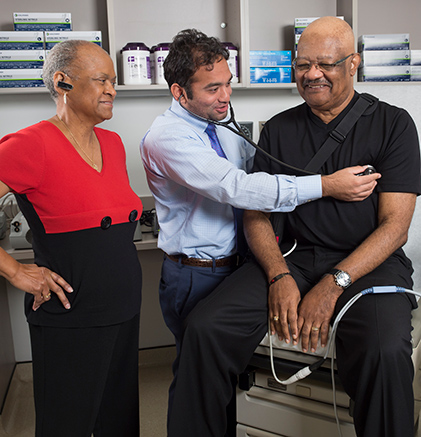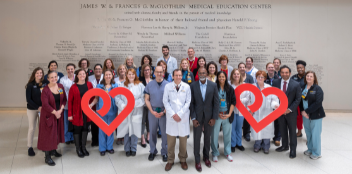Drug trials highlight novel therapies for age-related cardiomyopathy
VCU leads recruitment efforts
VCU Medical Center is leading an international effort to screen patients with transthyretin amyloid cardiomyopathy (ATTR-CM) and enroll them into a clinical trial testing a novel therapy called AG10. Among 51 recruitment centers in the U.S. and abroad, VCU ranks among the top 5 in recruiting patients into the trial.
“Enrollment has been fantastic,” said Dr. Keyur Shah, chief of the section of heart failure at Pauley and medical director of VCU’s Mechanical Circulatory Support Program. “It’s given our patients access to treatment they wouldn’t have had, because the only drug that’s available, Tafamidis, is unaffordable to many.”
“These achievements in enrollment not only increase Pauley’s visibility, they highlight VCU Health’s access to novel therapies for patients across Virginia,” added Laura Cei, clinical research nurse coordinator in the Department of Internal Medicine.
 Dr. Keyur Shah with a patient
Dr. Keyur Shah with a patient
Years ago, VCU Health made a commitment to the research, diagnosis and treatment of amyloidosis. Shah leads a renowned, multidisciplinary team of top physicians and surgeons in a center of expertise for patients in need of amyloidosis treatment and resources.
“We’re one of the leading enrollment centers in all of the U.S. because of a high population of referrals for TTR amyloidosis,” he said.
“Part of that has to do with improved recognition of the disease here in the community through outreach and education.”
Transthyretin amyloid cardiomyopathy is a rare, life-threatening heart condition affecting more than 400,000 people worldwide. The accumulation of an abnormal protein called transthyretin amyloid results in thickening and stiffening of the heart, which often leads to heart failure or even death.
Running through May 2023, a placebo-controlled clinical trial called ATTRibute is testing the efficacy and safety of AG10 in 510 adults with symptomatic ATTR-CM. An alternative to Tafamidis, the first FDA-approved drug to slow the progression of amyloid heart disease, AG10 was developed to bind the four arms of TTR protein and prevent it from turning into amyloid. The impact of AG10 versus the placebo is being evaluated in patients after 12 months and 30 months of treatment. At the end of 30 months, study participants may be eligible to receive AG10 with no placebo.
In addition to ATTRibute, two clinical trials recently underway and running through 2024 are testing ATTR-CM novel drugs called AKCEA-
TTR-LRx and Vutrisiran.
Participation in ATTRibute, and future trials, is a win-win for both patients and Pauley.
“By conducting these clinical trials at VCU, we are able to spread awareness of ATTR-CM,” Cei said. “We can also provide patients with a hub in which they can obtain ongoing support and continuing education about this disease.”
To learn more about amyloidosis and the VCU Health multidisciplinary team, visit vcuhealth.org/pauley-heart-center/our-expertise
Back to Spring-2020
Join our Pauley Consortium composed of patients, friends and advocates.

